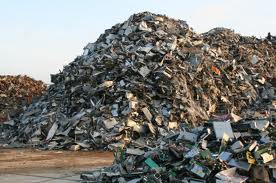 An EU-funded study has revealed continuing mismanagement in the collection and recycling of valuable e-waste.
An EU-funded study has revealed continuing mismanagement in the collection and recycling of valuable e-waste.
A recent article published by the European Commission revealed that a study undertaken by an EU-funded project has revealed weak links in the e-waste supply chain, despite the presence of a decade’s worth of EU legislation surrounding this issue.
According to the €2 million ($2.3 million) study, which ran from September 2013 to August 2015, a mere 35 percent of all e-waste in the EU was collected and recycled in 2012, with the remaining 65 percent being “either recycled under non-compliant conditions in Europe”, “thrown into waste bins” or exported.
The project’s scientific coordinator, Jaco Huisman of the United Nations University, said, “This means that a total of 4.65 million tonnes is wrongfully mismanaged or illegally traded within Europe itself.” He went on to add, “The widespread scavenging of both products and components and the theft of valuable components such as circuit boards and precious metals from e-waste, means that there is a serious economic loss of materials and resources directed to compliant e-waste processors in Europe.”
The study, which included case analyses of criminal activities, revealed various vulnerabilities located throughout the supply chain, including lack of required permits, theft, violations of WEEE trade regulations and false load declarations, as well as issues with prosecution and sentencing.
Interpol’s Ioana Botezatu commented that, in the wake of this study, “A recommendation roadmap with short, medium and long-term recommendations has been developed, with the aim of reducing illegal trade through specific actions.”
Since the conclusion of the project, known as CWIT, a number of “implementable measures” have been put into effect, according to Pascal Leroy, secretary general of the Waste Electrical and Electronic Equipment (WEEE) Forum. “Several legislative suggestions have already been taken on board by member states,” he said, “including a ban on cash transactions in the scrap metal trade and a reporting model that includes mandatory treatment and reporting of WEEE in accordance with improved standards.”
In addition, the DOTCOM Waste Project has been set up as “a direct follow-up” to CWIT, aiming to “develop dedicated training materials for law enforcement agencies”.
The EC’s article concluded with a statement from Botezatu, who said, “We hope that this project has opened policymakers’ eyes and showcased how fact-based research, coordination and support actions are instrumental in implementing waste legislation.”
